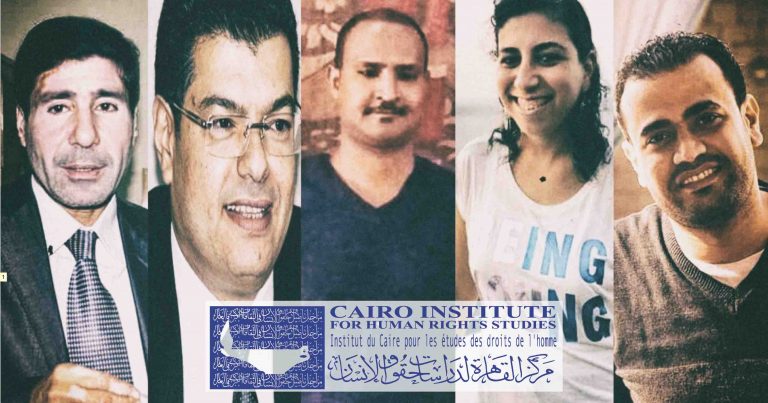
11 May, 2020
Egypt: At the risk of public health, prisoners of conscience continue to be added to Egypt’s overcrowded prisons
This post was first published by the Cairo Institute for Human Rights Studies
Amid widespread calls to reduce the country’s prison population in order to curb the COVID-19 pandemic, the Egyptian government has instead embarked on countrywide state security raids throughout the last two months, arresting dozens and adding even greater numbers of prisoners of conscience to its already dangerously overcrowded prisons.
The undersigned rights organizations condemn this recent security crackdown, which targets political activists, rights defenders, lawyers, and journalists, and call for an immediate end to any new arrests and detentions for exercising their lawful right to free expression. We further reiterate our demand for the release of prisoners of conscience and pre-trial detainees.
Throughout March and April, state security services arrested dozens of people from their homes in several governorates, even as Egyptian rights organizations, international rights organizations, political parties, and the UN urged the reduction of the country’s prison population by releasing certain categories of nonviolent or low-risk detainees. These arrests are increasingly targeting persons critical of the government’s COVID-19 response, levying the typical slew of charges – joining a terrorist group, misusing social media, and publishing false news- against those whose opinions on the coronavirus pandemic fall outside the state’s official narrative.
Atef al-Sayyed, the editor-in-chief of al-Qarar al-Dawli, published a comment about the number of people who have contracted the virus. After his arrest from his home in Aswan on March 14, he was forcibly disappeared for one month before appearing before the State Security Prosecution for questioning. Economic journalist Mustafa Saqr, the owner of al-Boursa and Daily News Egypt, was remanded to custody for 15 days on April 12th after he commented on policies and measures taken by the Central Bank to address the pandemic. Lawyer Mohsen Bahnasi is currently detained in connection with the same case. According to his lawyer, he was questioned about a post on his Facebook account about the need to release all pretrial detainees due to the coronavirus pandemic. All three men are currently charged by the State Security Prosecution with the oft-used, ready-made charges of joining a terrorist group, misusing social media, and publishing false news. No evidence has yet been provided for any of the charges, not even the name of the terrorist group to which they allegedly belong.
The same three charges – on terrorism, social media misuse, and publishing false information – were also brought against Aya Kamal and Amr Adel, both from Alexandria. Kamal posted on Facebook about the death of a military figure from COVID-19, while Adel uploaded a video he filmed of small protest marches in Alexandria against the coronavirus. Other prisoners of conscience were recently added to Egypt’s overpopulated prisons, including[1] journalist Ahmed Allam and translator and researcher Khuloud Said.
Fifteen people were arrested, including a doctor and a pharmacist, after complaining about shortages in medical equipment, announced the spokesperson for the Office of the High Commission on Human Rights. Rights organizations have documented the arrest of five more people in case no. 575 of 2020 after they released a video demanding that their detained family members be released, fearing the spread of COVID-19 in prisons.
These prosecutions coincided with vicious campaigns against international media outlets to prevent the circulation of any news about the coronavirus epidemic and its spread in Egypt that contradicts official narratives. On 17 March, the Egyptian authorities shut down the Egypt bureau of the British Guardian and revoked its accreditation after the paper published a report questioning the official number of COVID-19 victims; the authorities also deported the paper’s correspondent in Egypt. The Egypt correspondent for the New York Times was warned to consult “official sources for news reported about Egypt and comply with professional rules.”
Confronting COVID-19 does not require prosecuting anyone who publishes news or information at odds with the state’s official narrative. Policies designed to intimidate anyone who attempts to reveal shortcomings in the state’s conduct toward the pandemic must come to an end. And the state’s conduct – escalating arrest campaigns and adding to Egypt’s already-teeming prison population to the peril of public health – deserves to be critiqued in a transparent, fair and objective manner if Egypt is to be able to effectively counter the surge of COVID-19 infections in the country.
Signatory Organizations
- Cairo Institute for Human Rights Studies
- Association for Freedom of Thought and Expression
- Belady Center for Rights and Freedoms
- Committee for Justice
- Egyptian Front for Human Rights
- Nadeem Center for Torture Victims
[1] On 28 April, journalist Ahmed Allam appeared before the State Prosecution following a seven-day disappearance after he was arrested from his home in Giza on 21 April. He was charged in case no. 558/2020, as was translator and researcher Khuloud Said, who appeared before the prosecution following a six-day disappearance after she was arrested from her home in Alexandria on 22 April. The prosecution remanded both of them in custody on charges of joining a terrorist group, publishing false news, and misusing social media.



